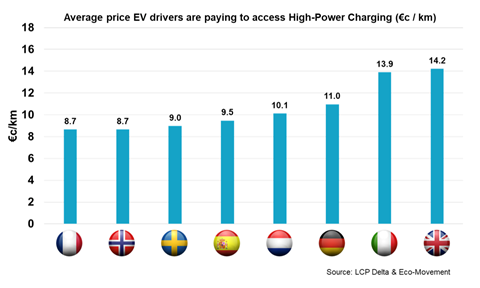
British EV drivers are paying 74% more for high-power charging on average, at over €c14 per kilometre, compared to drivers in France and Norway.
This is according to information from LCP Delta’s new data product, CHARGEtrack. This tool collects and synthesises tariff data from thousands of chargepoint operators (CPOs) and e-mobility service providers across 32 European countries. It offers comprehensive competitor benchmarking, enabling users to search and compare tariffs, and monitor pricing trends over time.
LCP Delta teamed up with its data partner Eco-Movement to offer a snapshot of the current tariffs being offered by over 100 CPOs providing high-power chargers (HPC) to EV drivers across Europe. The tariffs studied are so-called ‘ad-hoc tariffs’ that typically operate on a pay-as-you-go basis, using a credit or debit card, similar to the way petrol or diesel is sold at refuelling stations.
Key findings include:The UK has the most expensive prices:
* At €c14.2 per kilometre, EV drivers in the UK are paying the most for high-power charging. Relatively higher electricity costs and lower CPO utilisation rates compared to other markets are likely the most influential factors.
* Prices are cheapest in France and Norway: EV drivers in these markets typically pay the equivalent of €c8.7 per kilometre to recharge.
* The largest passenger car market in Europe offers mid-range pricing: In Germany, EV drivers pay €c11.0 per kilometre. In the Netherlands, the average price is equivalent to €10.1 per kilometre, whereas in Italy, it’s €c13.9 per kilometre.
* The cheapest tariff for accessing HPC chargers was found in France: The company IECharge offers high-power charging at €c30/kWh, equivalent to €c5/km. At the other end of the spectrum, the most expensive CPO was found in the UK with an ad-hoc tariff of more than €1/kWh (£0.89/kWh), equivalent to €c17 per kilometre.
John Murray, head of EVs at LCP Delta, said: “For EV drivers that are reliant on public charging, comparing the different prices on offer can be a very complicated task.
“Our research shows the large differences between tariffs and between countries. The most expensive tariff we found – in the UK – is three times more expensive than the cheapest tariff we came across in France. For the first time, this tool gives a bird’s eye view of public charging prices, bringing some much-needed clarity to the complex patchwork of tariffs. As the market grows, there will be increasing consumer scrutiny of this.”
































